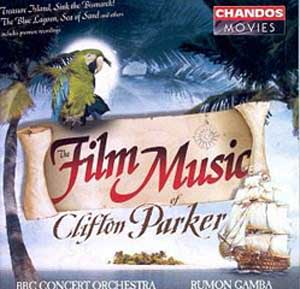The Film Music of Clifton Parker ;
Music composed by Clifton Parker
Suite from Treasure Island (1949) (arranged by Philip Lane) [23:35]: (Main Titles and The Admiral Benbow [3:59]; To Bristol/Setting Sail [2:24]; On the Island [2:24]; Storming the Stockade [3:09]; Jim Hawkins, Ship to Shore [3:35]; Looking for the Treasure [2:20]; Leaving the Island [4:58]
Seascape Western Approaches (1944) (edited by Philip Lane) [4:37];
The Sword and the Rose (1952) (reconstructed, arranged and orchestrated by Philip Lane) [7:23]: (Fanfare [1:27]; Galliard [1:11]; Lute Dance [2:47]; Volta [2:00])
....from Sea of Sand (1958) (arranged and orchestrated by Philip Lane) [3:10]
The Blue Lagoon - Rhapsody for orchestra (1948) (reconstructed, arranged and orchestrated by Philip Lane) [9:15]
Theme from Night of the Demon (1957) (reconstructed and arranged by Philip Lane) [3:02];
Virgin Island: A Caribbean Rhapsody (edited by Philip Lane) [9:24]
March from Sink the Bismarck! (1960) (orchestrated by Philip Lane) [4:19]
Blue Pullman (1960) (arranged by Philip Lane)
Performed by the BBC Concert Orchestra/Rumon Gamba
rec. Walthamstow Town Hall, 29-30 March 2004
CHANDOS CHAN 10279
Running Time: 79:39
Crotchet Amazon UK Amazon US

Although the British composer Clifton Parker also wrote concert music including the opera Pyatigorsk, broadcast by BBC Radio 3 in 1973, his claim to fame rests on his film music and specifically on Seascape from Western Approaches. It was this work that earned itself a place on EMI Classics now long forgotten CD collection of British golden age film music 78s on CDGO 2059.
The score for Treasure Island reeks of the spume, salt and ozone. The seven movement suite traverses various scenes. There is a Handelian oceanic majesty in the opening titles woven with references to “Yo-Ho-Ho and a Bottle of Rum!” - a reminiscence that returns momentarily in Looking for the Treasure. Then there is the more impressionistic Baxian ‘wash’ of To Bristol. On the Island is a sort of sinister scherzo with minatory dark clouds scudding across the sky. In Storming the Stockade the shade of Shostakovich and of the Nordic Bax crosses the horizon. The uneasy restfulness of both Shostakovich and Bax also pervades the Jim Hawkins, Ship to Shore movement. Leaving the Islandis the final and longest movement - a miniature tone poem - a sort of overture in retrospect. This is music for a grand yarn and although it lacks the emotional reach of Korngold’s pirate scores it is richly orchestrated and full of atmosphere.
The Seascape for Western Approaches is a magical piece - about the same length as a Liadov tone poem. Once again it surges and heaves with the long slow swell of the Atlantic, dignified yet intensely romantic. In such a small span Parker catches the majestic essence of the scene and the era.
The Tallis Fantasia must have been in Parker’s mind for The Sword and the Rose where that voice is blended with the awesome majesty of Purcell’s courtly music. The other movements look towards the ‘Danserye’ style of Susato and Praetorius locking into the neo-Tudor styles of Moeran (Serenade) and Warlock (Capriol). The Sea of Sand march is jaunty with a gap-toothed smocks-and-straw grin and an acidic twist from Alan Rawsthorne.
For the Blue Lagoon Rhapsody Parker returns to his prime metier: the breakers and the salty romance of the sea. Debussy (La Mer), Ravel (La Valse), Bax’s Tintagel and even Kabalevsky are presences. The wash and undertow of breakers on the coral reef, of white sands, love and loneliness - they’re all there in this Rhapsody. The score may not have quite the grand impact that Basil Poledouris delivered for his music for the 1980 remake but it is very good in its own right. I remember the film very well from its showings during 1960s Sunday film matinees on BBCTV.
For the occult classics Night of the Demon the music is suitably turbulent and almost angular. This contrasts with the warm breezes, España reminiscences and Latino calm that suffuses the Caribbean Rhapsody. Solo guitar, bongos, maracas and timbales add flavour to this example of laid-back light music. Think in terms of Malcolm Arnold’s Commonwealth Christmas Overture and Alwyn’s Calypso from Rake’s Progress.
Gamba is good throughout but I thought he managed the nobilmente of the Sink the Bismark! March - a concert item in its own right - very well. Parker also made a concert march out of his music for another 1950s rouser ‘The Yangtse Incident’ but at 79:39 there was no space for it here.
The Blue Pullman is a continuous piece spanning 15 minutes - pleasing yet undemanding train music. It is drawn from Parker’s score for the 1960 train documentary about the Manchester-London service. It has its moments especially in the closing pages but overall is rather over-extended and bland without the film. If you were wondering, this is not another Coronation Scot but slots in comfortably with Richard Rodney Bennett’s tauter and more memorable score for Murder on the Orient Express.
I keep hoping that Chandos will next turn to Brian Easdale’s scores. They really are worth the effort. But back to Parker. He had a real gift for sea music both tender and stormy. Don’t miss it.
Rob Barnett
Not Rated.
Return to Index